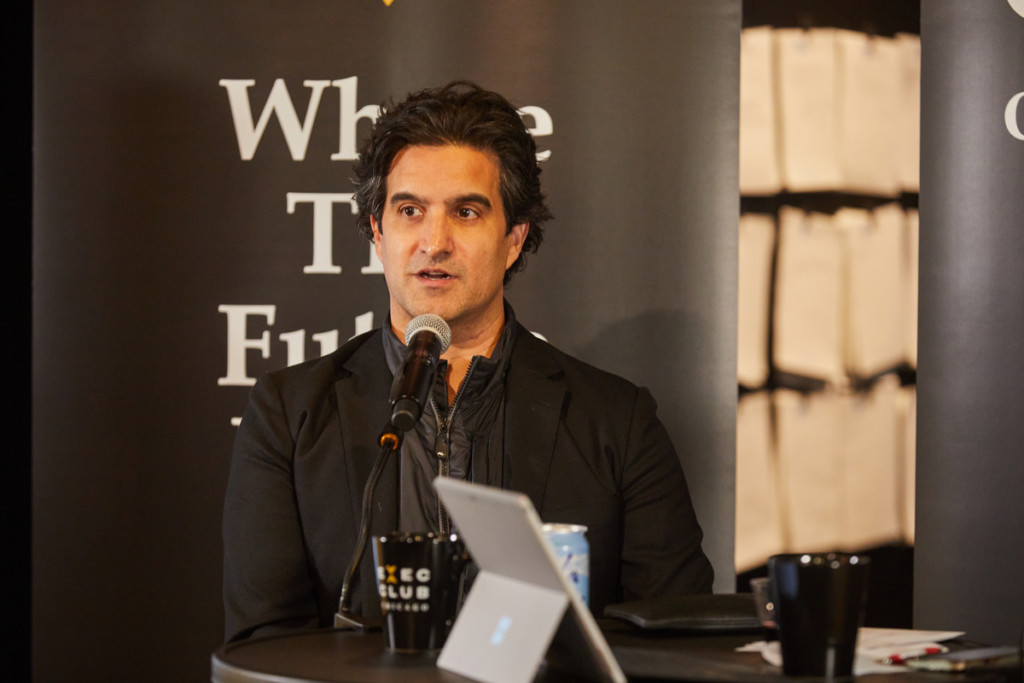Founding CEO of Bonobos, Andy Dunn, joined the Executives’ Club to discuss his newly released memoir Burn Rate: Launching a Startup and Losing My Mind. The book explores Dunn’s entrepreneurial journey, its intersection with mental illness, and what companies can do to promote employee mental wellness.

Entrepreneurship Often Cloaks Mental Illness
Every entrepreneur knows owning a business feels like a rollercoaster ride complete with extreme highs, like successfully raising millions, and devastating lows, like taking on excessive debt. As Dunn, diagnosed with bipolar disorder type 1, points out, these highs and lows of entrepreneurship can often cloak the symptoms of a mental illness like bipolar disorder.
Dunn had his first manic episode while he was a student at Northwestern University. His parents admitted him to a hospital, where he was diagnosed with bipolar disorder type 1. Dunn says he ignored his bipolar diagnosis at first and didn’t take care of himself. Later, as he started Bonobos, he found his condition could fuel him in the highs, raising millions and hiring 600 employees. He also found living with bipolar disorder sunk him into the lows where he would withdraw and hide from work.
Dunn cautions entrepreneurs to approach starting and running a business with attentiveness, pointing out that one in five entrepreneurs have a mental illness. “Do it, but go in eyes wide open and be prepared to take care of yourself along the way,” says Dunn.

People Are Not Their Mental Illness
In 2016, as Dunn prepared to propose to his girlfriend, he experienced his second catastrophic manic episode.
Coming out of hospitalization the second time was different from the first. One, this time police arrested Dunn for a felony and misdemeanor assault. But two was because his future wife’s mother sat him down and compared his diagnosis to diabetes, saying as long as he took his medication, the family would continue to love him.

These words from his future mother-in-law meant a lot to Dunn. It was the first time someone compared his mental illness to a physical one, helping him understand that bipolar disorder was something he had and was not who he was.
“The language we use around bipolar disorder is tough because we tend to ‘say someone is bipolar,’ which is like saying, ‘someone is cancer,’” explains Dunn. “We equate the identity and the illness together when it comes to mental illnesses.”
Organizations Should Invest in Employees’ Mental Wellness
Dunn credits surviving his second manic episode to family, fortune, and privilege. He had a family offering him conditional love as long as he cared for himself. He had the fortune to find a doctor who was both a psychiatrist and a therapist to provide comprehensive treatment. And he had the privilege to afford care, something many Americans don’t have. Dunn points out that mental health care and wellness are unfortunately not accessible to everyone. Still, companies can lead the charge in assisting employees by sharing vulnerabilities, providing mental health training, and investing in mental wellness.
Share Your Vulnerabilities
As a leader within an organization, Dunn says it’s important to share your vulnerabilities with your team. Host a fireside chat and talk about the challenging personal aspects of life, not just company struggles. Starting the conversation from a leadership position creates a safe space for others to come forward when dealing with a complicated mental health situation.
Providing Mental Health Training
Dunn explains that often when a person discloses their mental health status at work, it’s to a peer, who is often unequipped to receive the information. Coworkers are not mental health professionals. However, some resources, such as Jack.org, help train employees on what to do if someone discloses sensitive information. Dunn urges companies to train all employees to handle conversations about mental health.

Invest In Employee Mental Health
Dunn suggests companies invest in employees’ mental health by offering stipends or reimbursing employees for therapy or medications to offset the financial burden. Unfortunately, insurance won’t cover or reimburse most mental health care. The government also won’t likely implement any federal laws to make mental health care more accessible.
Sponsors of the Executives’ Club Signature Event Series include Accenture, Ann & Robert H. Lurie Children’s Hospital of Chicago, Deloitte, Chicago Cubs, Northwestern Medicine, Sidley, William Blair, Ulta Beauty, CDW, and more.
How to Help or Get Help:
If you or someone you love is struggling and needs mental health support, or to support an organization providing critical support to those facing mental health challenges, here is a collection of advice and resources and here is a list of organizations to get help from or support so that they can continue providing critical support to others.
More From Better:
- New in Town: Plant-Forward Spots, New Orleans in Hyde Park, a Tiki Bar in Rosemont and a European-Style Cafe in Evanston
- Support a Thriving Garfield Park Community: Donate or Register Now for Breakthrough’s Annual Benefit
- The Best Farms for Apple and Pumpkin Picking Around Chicago and the Suburbs

Jessica Braun Gervais is a Chicago-based freelance writer specializing in health, wellness, and fitness. She earned a B.A. in Journalism from Columbia College and has written content for various health and wellness institutions. Jessica Braun’s passion for wellness comes from her life as an elite athlete competing in Muay Thai kickboxing competitions across the country. In addition to sharing her expertise through writing, Jessica Braun also works as a group fitness instructor and personal trainer. When she’s not writing or training, Jessica Braun enjoys reading historical fiction novels, discovering new coffee shops, and cuddling with her cattle dog, Brady.

